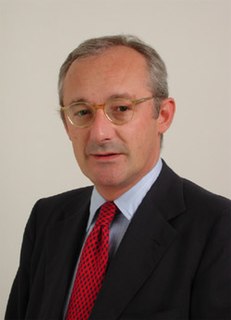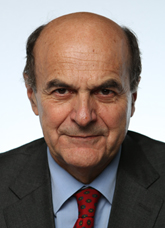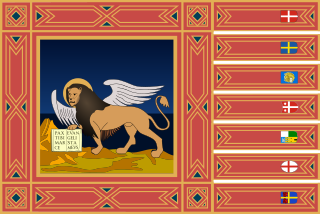The Emilia-Romagna regional election of 1990 took place on 6 May 1990.
The Italian Communist Party was by far the largest party. After the election Enrico Boselli, regional leader of the Italian Socialist Party, formed a government comprising the Communists and the Italian Democratic Socialist Party.

The Italian Communist Party was a communist political party in Italy.

Enrico Boselli is an Italian politician. He has been Vice President of Alliance for Italy, and is the former leader of the Italian Democratic Socialists and the modern-day Italian Socialist Party, and former President of Emilia-Romagna.

The Italian Socialist Party was a socialist and later social-democratic political party in Italy. Founded in Genoa in 1892, the PSI dominated the Italian left until after World War II, when it was eclipsed in status by the Italian Communist Party. The Socialists came to special prominence in the 1980s, when their leader Bettino Craxi, who had severed the residual ties with the Soviet Union and re-branded the party as liberal-socialist, served as Prime Minister (1983–1987). The PSI was disbanded in 1994 as a result of the Tangentopoli scandals. Prior to World War I, future dictator Benito Mussolini was a member of the PSI.
In 1994 Boselli, who had been elected to the Parliament of Italy, was replaced by Pier Luigi Bersani of the Democratic Party of the Left, the successor party of the Communists.

Pier Luigi Bersani is an Italian politician and was Secretary of the Democratic Party (DP), Italy's leading centre-left party, from 2009 to 2013. Bersani was Minister of Industry, Commerce and Craftmanship from 1996 to 1999, Minister of Transport from 1999 to 2001, and Minister of Economic Development from 2006 to 2008.

The Democratic Party of the Left was a democratic-socialist and social-democratic political party in Italy. Founded in February 1991 as the post-communist evolution of the Italian Communist Party, the party was the largest in the Alliance of Progressives and The Olive Tree coalitions. In February 1998, the party merged with minor parties to form Democrats of the Left.
This page is based on this
Wikipedia article Text is available under the
CC BY-SA 4.0 license; additional terms may apply.
Images, videos and audio are available under their respective licenses.

The Italian Democratic Socialists were a social-democratic political party in Italy. The party was the direct continuation of the Italian Socialists, the legal successor of the historical Italian Socialist Party. Also the Italian Democratic Socialist Party, the other long-time Italian social-democratic party, was merged into it.

The Italian Socialists were a minor social-democratic political party in Italy active from 1994 to 1998. The party was the successor of the Italian Socialist Party.

General elections were held in Italy on 19 May 1968 to select the Fifth Republican Parliament. Democrazia Cristiana (DC) remained stable around 38% of the votes. They were marked by a victory of the Communist Party (PCI) passing from 25% of 1963 to c. 30% at the Senate, where it presented jointly with the new Italian Socialist Party of Proletarian Unity (PSIUP), which included members of Socialist Party (PSI) which disagreed the latter's alliance with DC. PSIUP gained c. 4.5% at the Chamber. The Socialist Party and the Democratic Socialist Party (PSDI) presented together as the Unified PSI–PSDI, but gained c. 15%, far less than the sum of what the two parties had obtained separately in 1963.

General elections were held in Italy on 5 and 6 April 1992 to select the Eleventh Republican Parliament. They were the first without the traditionally second most important political force in Italian politics, the Italian Communist Party (PCI), which had been disbanded in 1991. It was replaced by a more social-democratic oriented force, the Democratic Party of the Left (PDS), and by a minority entity formed by members who did not want to renounce the communist tradition, the Communist Refoundation Party (PRC). However, put together they gained around 4% less than what the already declining PCI had obtained in the 1987 Italian general election, despite PRC had absorbed the disbanded Proletarian Democracy (DP).
The Association for the Rose in the Fist was a social-democratic political association in Italy. It was the so-called "third component" of the Rose in the Fist (RnP), a political alliance composed mainly of the Italian Democratic Socialists (SDI), a social-democratic party, and the Italian Radicals (Rad), a liberal movement.

The Venetian regional election of 1990 took place on 6 May 1990.

The Italian Socialist Party is a social-democratic political party in Italy.

The Calabrian regional election of 1990 took place on 6 May 1990.

The Piedmontese regional election of 1990 took place on 6 May 1990.

The Tuscan regional election of 1990 took place on 6 May 1990.

The Umbrian regional election of 1990 took place on 6 May 1990.

The Sardinian regional election of 1984 took place on 24 June 1984.

The Sardinian regional election of 1979 took place on 17 June 1979.

The Sicilian regional election of 1955 took place on 5 June 1955.

The Sicilian regional election of 1967 took place on 11 June 1967.

The Sicilian regional election of 1976 took place on 20 June 1976.

The Sicilian regional election of 1981 took place on 21 June 1981.
The Italian general election of 1948 took place on 18 April 1948.


















